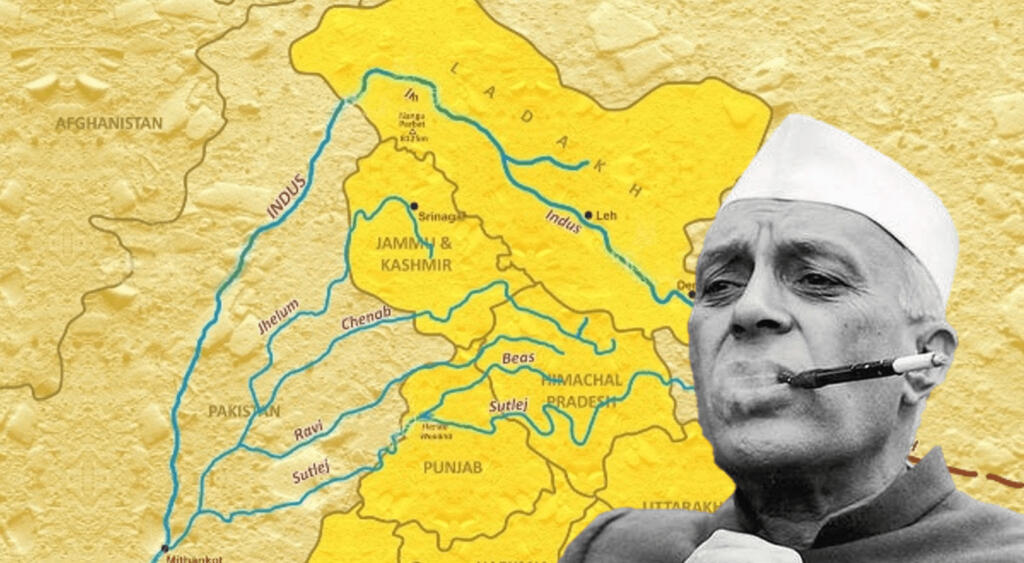- In August this year, the parliamentary standing committee on water resources suggested that the government should renegotiate the Indus Water Treaty (IWT).
- India has been using only 20 per cent of the total water carried by the Indus rivers system in a non-consumptive manner.
- The UPA government maintained a soft approach towards Pakistan and carried out the legacy of Nehru.
In the last seven years, the Modi government corrected many Nehruvian blunders; abrogation of Article 370, and privatisation of Air India to name a few. Another big Nehruvian blunder that needs to be corrected is the Indus Water Treaty (IWT), under which the government led by Nehru gave more than 70 per cent of water use rights of the Indus Water System to Pakistan.
In August this year, the parliamentary standing committee on water resources led by BJP MP from Bihar, Sanjay Jaiswal, suggested that the government should renegotiate the six-decade-old treaty in the light of climate change. The report noted that “present-day pressing issues such as climate change, global warming and environmental impact assessment were not taken into account by the treaty”, which had otherwise “stood the test of time”.
“There is a change in rainfall pattern. There are instances of more high-intensity rainfall as well as long stretches where there is low rainfall. The second major change is glacial melt. The contribution of glaciers in the Indus basin is higher than in the Ganges or Brahmaputra basins. Because there is a fragile Himalayan region involved, there is greater frequency of landslides and flash floods,” argued the report.
In the last few decades, the water levels is consistently depleting in Punjab and Northern Rajasthan, the areas which can be easily served by the Eastern Rivers of the Indus water system. The Committee urged the Union government to expedite new projects like the one on the Ujh, a tributary of the Ravi, as well as the Shahpurkandi on the Ravi itself to exploit the full potential of the rivers for irrigation and other purposes.
The Ujh dam is a multipurpose project in the Kathua district of Jammu & Kashmir over the river Ravi. The dam will have the capacity to generate 196 MW of electricity and be used for irrigation in neighbouring areas. The Shahpur-Kandi dam, a joint project between Punjab and J&K government was started in 2013 but halted due to some issues on part of the J&K government.
The Modi government is already implementing projects to ensure 100 per cent utilisation of India’s share of water. In 2016, the government constituted a high-level task force led by the principal secretary to the Prime Minister Nripendra Mishra, NSA Ajit Doval, foreign secretary Jaishankar and finance secretary Ashok Lavasa as members to better utilise India’s share of the Indus river system without scrapping the Indus Water Treaty (IWT).
As per the IWT, control over the water flowing in three eastern rivers of India- the Beas, the Ravi, and the Sutlej rivers with the mean flow of 33 MAF was given to India, and the control over the water flowing in the Indus, the Chenab and the Jhelum rivers with the mean flow of 80 MAF has been given to Pakistan. India has been using only 20 per cent of the total water carried by the Indus rivers system in a non-consumptive manner while Pakistan makes use of the remaining 80 per cent. However, previous Indian governments never used even that 20 per cent of the share and allowed Pakistan to make full use of it.
The water treaty was brokered by the World Bank in 1960 and since then, despite the treaty being in favour of Pakistan, India has maintained an uninterrupted flow of Pakistan’s share of water. In fact, India never used its own share of Indus river water and as a result, it flowed down to the other side. This, in turn, helped the agricultural economy of Pakistan to prosper.
Both the countries have fought three full-fledged wars since the signing of IWT, with India getting enough opportunities to starve the people of Pakistan by diverging the Indus waters but it maintained restraint.
Read more: Nehru deserved “The Medal of the Republic” for his faithful service to China
The UPA government maintained a soft approach towards Pakistan and carried out the legacy of Nehru with uninterrupted water supply in Pakistan, but the Modi government should renegotiate the deal to ensure that the farmers in Punjab and Rajasthan get better access to irrigation and at the same time, Pakistan’s agriculture-dependent economy can be further weakened.
